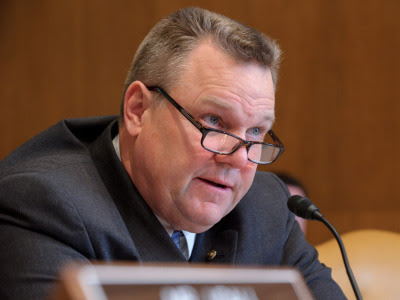USDA is making available a fresh round of funding through the Regional Agricultural Promotion Program, a $1.2 billion effort funded from the department’s Commodity Credit Corporation.
The department announced the allocation of the first $300 million in funding in May, and now is offering another $300 million in grants for export promotion. The program is intended to develop new markets in countries other than China, Canada and Mexico. Some $25 million was set aside in each of the first two rounds of funding specifically for projects in Africa.
The funding was requested by leaders of the Senate Agriculture Committee and comes at a time that Congress continues to struggle to pass a new farm bill with funding for two existing export-oriented programs, the Market Access Program and the Foreign Market Development program.
In May, USDA awarded grants to 66 organizations, which were selected from $1 billion in proposals.
 Sen. Jon Tester, D-Mont.
Sen. Jon Tester, D-Mont.Vice President Kamala Harris has gained backing from Democratic delegates as the candidate for the presidency, but her coastal background may spell trouble for one vulnerable senator whose seat is key to deciding control of the Senate, according to election analyst David Wasserman.
Sen. Jon Tester, D-Mont., is vying to retain his seat in a heavily Republican state against former Navy SEAL Tim Sheehy, who Wassermann said looks to be a stronger opponent than some of Tester’s past rivals. Harris, with her California background, may not play as well in Montana as President Joe Biden would have, Wasserman said at the International Sweetener Symposium in Seattle on Monday.
“Whereas Kamala Harris has lifted Democrats’ chances in a lot of states with more diverse populations, I think she’s a net negative for Tester in Montana, because that California Bay Area brand is really toxic — more so than Joe Biden’s brand in a state like Montana,” said Wasserman, senior editor and elections analyst for the Cook Political Report with Amy Walter.
Take note: Wasserman believes another senator facing a tough reelection bid, Sen. Sherrod Brown, D-Ohio, faces a “slightly better opportunity” for re-election than Tester due to having a "weaker opponent,” luxury car dealer Bernie Moreno.
Another thing to note: Even if Republicans are successful in winning control of the chamber, a narrow margin would empower moderate members of the party. Sens. Susan Collins, R-Maine, and Lisa Murkowski, R-Alaska, could frustrate more conservative members.
USDA pesticide official calls dicamba approval for 2025 unlikely
The head of USDA’s Office of Pest Management Policy doesn’t think EPA can reapprove over-the-top uses of dicamba in time for the 2025 growing season. “I cannot envision a path by which EPA would actually be able to do it,” Kimberly Nesci said at the Sweetener Symposium.
EPA has said that under its timeline for approving “new uses” under the Pesticide Registration Improvement Act, it would need up until late 2025 to review and make a decision on three applications for dicamba from Bayer, BASF and Syngenta.
Harvest season preparedness on agenda at grain car council meeting
A meeting is scheduled in Kansas City Aug. 27 to discuss how well prepared the rail market is to transport the 2024 grain harvest.
The meeting of the National Grain Car Council comes shortly after Surface Transportation Board Chairman Robert Primus told BNSF he has “grave concerns” about the company’s “ability to adequately serve the anticipated demand” during harvest season.
It’s easy to be “in the know” about what’s happening in Washington, D.C. Sign up for a FREE month of Agri-Pulse news! Simply click here
Primus will be speaking at the meeting, along with National Grain Car Council Chair Jon Harman, and NGCC Co-Chair Karen J. Hedlund. Items to be discussed include “expectations for the upcoming harvest, domestic and foreign markets, the supply of rail cars, and rail service; and market and industry updates,” the STB’s Federal Register notice says members of the public can register to attend virtually or in person.
Bezos puts money behind methane reduction
The Bezos Earth Fund is collaborating on a venture that will explore whether a vaccine can be developed to control methane emissions from cattle. The fund is giving $9.4 million to the Pirbright Institute and the Royal Veterinary College, both in the United Kingdom.
“This ambitious project seeks to use state-of the-art biotechnology to figure out the mechanism by which a vaccine could cut livestock methane emissions by more than 30%, addressing a major contributor to climate change,” the fund said.
The project is not “developing a methane vaccine per se, but rather defining what a successful vaccine needs to achieve,” said John Hammond, immunogenetics group leader at the Pirbright Institute.
Final word: "A new, better, stronger farm bill cannot come soon enough for our farm families. High costs of production and lower crop prices generally mean a lot of farm families are really struggling, and this is only going to become more acute as farmers try to secure loans when they can't cash flow." — Cassie Bladow, president of the U.S. Sugar Beet Association at the Sweetener Symposium.
Philip Brasher and Noah Wicks contributed to today’s Daybreak.



